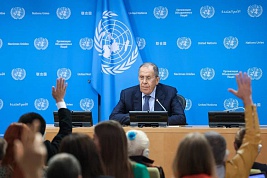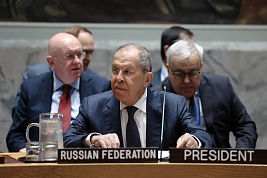Address by Sergey Lavrov, Chairman of the Committee of Ministers of the Council of Europe and Russian Minister of Foreign Affairs, at the Meeting of the Council of Europe Forum for the Future of Democracy on the Theme of "The Role of Political Parties," Moscow, October 18, 2006
Unofficial translation from Russian
Dear Mr. Chairman of the State Duma,
Dear Mr. PACE President,
Dear Mr. CE Secretary General,
Dear Deputies, Ladies and Gentlemen,
I am glad to welcome you to Moscow on behalf of the Russian Chairmanship of the Committee of Ministers of the Council of Europe. I am glad to note that many eminent politicians and public figures have responded favorably to the invitation to attend this key event for our chairmanship. The interest shown in it confirms that we have chosen a truly topical theme for Europe. I am certain that, representing such a broad spectrum of political views and traditions, and with your experience of political and parliamentary work in the diverse conditions of a changing world, you will be able, in the course of the discussions in the upcoming two days, to enrich the intellectual outfit with which Europe is moving into the future.
Streamlining the forms of democracy and civil society and adopting effective governance methods are among the priorities of the Russian chairmanship. This theme is inextricably linked with our other priorities: strengthening the national mechanisms of human rights defense, tolerance and mutual understanding, improving access to social rights and protecting vulnerable population groups. All these tasks bear a long-term, strategic character. And although Russia's Chairmanship of the CMCE is drawing to an end, they will unquestionably remain on the agenda of the bodies of executive and legislative authority of the Russian Federation.
The new Russia has pursued and will continue to pursue an open and predictable foreign policy, which is a function of our internal changes. Civil society and democratic institutions, as historical experience shows, can successfully evolve only on the basis of reinforcing the economic and social fabric of society, which is possible in the conditions of stability. Hence our choice in favor of the evolutionary path of national development. This, in turn, requires a compromise of all the sections and social groups, what is customary to call public consensus. It was not overnight, but as a result of trial and error, that we in Russia arrived at such consensus. The pace of our transformations might not suit somebody. But along the path of such deep, I won't be mistaken if I say unprecedented, reforms the country can move only together. Herein lies, probably, the main achievement of our internal development in recent years.
Russia is a part of an interdependent world, and without it the solution of the key problems facing humanity is impossible. Globalization dictates the need for a joint, collective response of the world community to global challenges and threats.
Competition is acquiring a truly global character. Both value guidelines and development models become its subject, leaving no room for claims to civilizational exclusiveness. That's why it is so important to deepen intercivilizational dialogue and take good care of national distinctiveness and of the cultural and civilizational diversity of the world, showing itself in, among other things, the distinctions of political systems. I am deeply convinced that the fundamental values of democracy, even though they bear a universal character, are realized in each country in their own way, with due regard for national traditions and other peculiarities. Each society at its own pace moves towards this "destination," to use the expression of US President George W. Bush in his address at the 61st session of the UN General Assembly. As far as I can judge by the first results of the session's debate, the understanding of this reality is increasingly making its way in the international community.
I call on you to ponder the criteria for "maturity" or "youth" of democracy. Somebody would like to draw the dividing line in this regard on our continent by determining the rights of some and the duties of others. We know instances when so called established democracies persistently refuse to introduce into national legislation, for example, a provision on the mandatory invitation of international observers to elections for central bodies of legislative authority. Whereas countries which are categorized as democratically "immature" have long since legislatively confirmed this rule and strictly abide by it. Any double-standard, discriminatory approaches aren't helpful to the cause: they do not add to mutual understanding in Europe, but rather undermine it. By the way, I shall take this opportunity to call on you to back up the elaboration of a new Council of Europe convention on the standards of democratic elections. Russia has proposed the appropriate draft and hopes for constructive joint work.
We must all treat respectfully the customs and traditions of each other. If we manage to get rid of a belief in our own infallibility, if we don't try to put everybody on the same level, many tasks on the European agenda will be solved more quickly and effectively. Only in this way can we really expect to overcome the legacy of the bloc policy of the past.
Political parties play a key role in any democratic process. In a certain sense they are brokers between citizens and state institutions. Without parties it is impossible to expressly represent the interests of the various social strata. The party system is a catalyst for discussion on issues of interest to the entire society. Parties, like the media, mold public opinion and work out models of solutions to the problems facing the state and society.
Despite the so diverse functions and influence of parties, many European countries encounter an obvious fall in public trust in the political class, and a general decline in interest in political life and especially personal involvement in it is also noted. I think the participants in our forum should discuss the causes of these phenomena and continue debate on how this reflects on the effectiveness in the functioning of democratic institutions.
The danger of Europe's sliding towards "party political apathy" is quite real. We should all give thought to what can be counterposed to this challenge. For nature abhors a vacuum. And a political vacuum immediately starts to be filled with ideas which are sometimes not innocuous and stand in the way of healthy social development. Nationalism and populism, xenophobia and intolerance, the diverse manifestations of man-hating - these are all quite real threats to present-day Europe. Many European countries encounter a social environment altering due to well-known demographic, migrationary and other reasons. People do not always feel confident and they experience political, everyday discomfort. And who, if not parties sticking to the principles of democracy and human rights, is to give answers to these challenges? I think that these problems should also be examined at this Forum.
There are a number of other issues without the consideration of which the debate on the role of political parties isn't going to be complete and meet the requirements of our time. For instance, can we say that they reflect the entire social and political diversity of the European continent? If not, then what is to be done to increase the representativeness of parties? Or what is the ratio between "traditional" and "young" parties? Do our political systems always demonstrate an ability to adequately respond to "impulses from below"? Can the rules of internal party life be considered as meeting the present day standards and requirements and the norms of political ethics and transparency? How are parties as political institutions accountable to the citizenry? The list of such questions could be continued.
Of course, answers can't be find to these complicated questions in two days. But they ought to be searched for, particularly through an exchange of experience and useful ideas and suggestions in the field of party building.
The Russian CMCE Chairmanship has backed up the idea of converting the Forum for the Future of Democracy into an instrument for a periodic exchange of views on the most topical issues in the political development of Europe. This process began in Warsaw last year, and now the baton of Moscow, I understand, will be taken over by other capitals - Stockholm and Madrid. Hopefully the findings and recommendations of the Moscow Forum will be taken due account of at the subsequent stages. I am certain that in this way we shall manage to commence an important dimension of mutual engagement within the Council of Europe, which will help to achieve the fundamental aim of creating a Europe without dividing lines.
In a few minutes' time we shall hear the addresses of the Secretary General of the Council of Europe, Mr. Terry Davis, and the President of the Parliamentary Assembly of the Council of Europe, Mr. Rene van der Linden. Before yielding the floor to them, I would like to thank them for their assistance to the Russian CMCE Chairmanship, particularly in organizing the present event. I hope it will become our common success.
Thank you for your attention.
October 18, 2006


